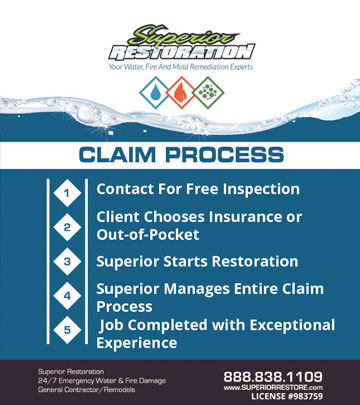The ‘coronavirus’ is still on the rise and continuously causing...
Read More
Menu






Our team’s #1 Focus is to provide all of our customers with an Exceptional Experience. Period!
How we create Exceptional Experiences:
We not only provide an Exceptional Experience to our customers but also our employees, vendors/subs, adjusters & we serve our local community through Non-Profit work.
Don’t forget to check out our 5 Star Team.





The ‘coronavirus’ is still on the rise and continuously causing...
Read MoreDuring the winter, we typically choose to stay indoors and...
Read MoreWhen water seeps into the baseboards, it can cause a...
Read MoreWater damage has been a concern not only in the...
Read MoreWhen you’re dealing with water damage in the Irvine area, the last thing you need is more stress and uncertainty. That’s why it’s essential to have a reliable partner like Superior Restoration by your side. Our expert team understands the challenges of water damage, including the potential for secondary damage and added expenses. With our help, you can trust that your property is in capable hands, and you can focus on getting back to your normal routine.
At Superior Restoration, we prioritize delivering exceptional service and a stress-free experience for our customers in Irvine. Our team of highly trained professionals uses the latest technology and techniques to handle disasters of all sizes, ensuring that your property is restored to its pre-damage condition as quickly as possible. Whether you’re dealing with a small leak or a major flood, you can count on us to provide prompt, efficient service and outstanding results in the Irvine area.
Visit Restoration Industry Association for information on how restoration affects homes. http://www.restorationindustry.org/
Call us anytime for immediate assistance with water damage, extraction or cleanup. We will take care of you with the best level of service in the area and get the job done with top-of-the-line industry equipment.
We are open 24/7 for any type of emergency.
Regular office hours are Monday-Friday 8 am to 5 pm.